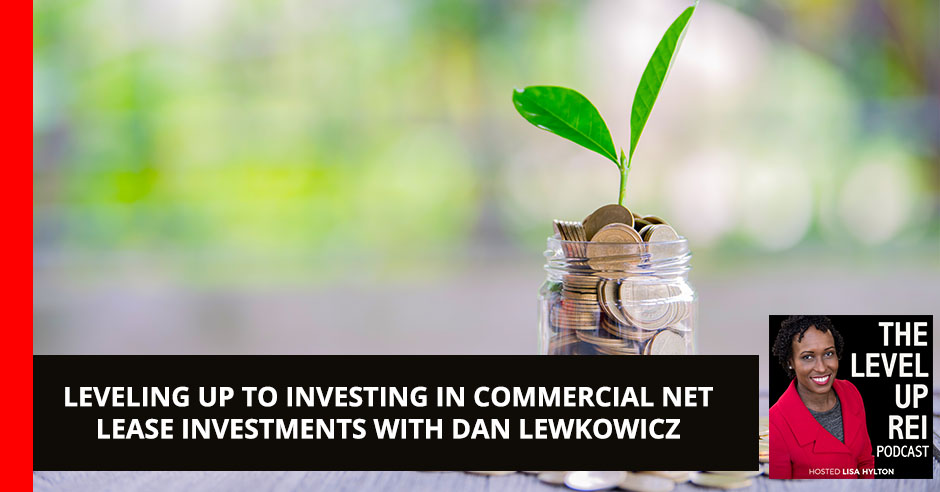
Learn all about commercial net lease and real estate brokerage with Dan Lewkowicz. Dan is a seasoned real estate veteran with over 15 years of experience in the real estate industry. He is the Director of Investment Sales of Encore Real Estate Investment Services. Dan is also teaching up-and-coming brokers with his Online Commerical Real Estate Courses. Lisa Hylton sits down with Dan to discuss all things net lease. Learn what differentiates it from multifamily and how the pandemic affected the industry. If you want to get into this area of real estate, listen in.
—
Watch the episode here
Listen to the podcast here
Leveling Up To Investing In Commercial Net Lease Investments With Dan Lewkowicz
On the show, we have Dan Lewkowicz.
Thanks for having me.
It’s nice to have you. Thank you for coming on. Dan is a seasoned real estate veteran with years of experience in many facets of the real estate industry. He started his career in house hacking, and quickly moved to the flipping houses in and around Metro Detroit. He eventually created a company called Renaissance Real Estate Ventures, which specializes in acquisitions, financing, renovations, resale of single-family residential properties in the booming City of Detroit, Michigan. Welcome to the show, Dan. I’m happy to have you.
Thanks for having me. I appreciate it. I’m looking forward.
The real value of a property is net operating income and the cap rate. Share on XMy readers are aware that my show is broken into three parts. One, we start with getting to know you a little bit. We then get into the meat of the episode and we close things down with the level of questions. A little bit about yourself, it sounded like you were in the Detroit area. Can you share with my readers what part of the US do you live in?
I live in Metro Detroit in Michigan.
What do you and your family like to do for fun?
Definitely travel and go out to nice restaurants. I love cars, so I like to cruise and enjoy the scenery here in Detroit. I love to read, play music, eat good food, and have good fun.
The fact that you love cars makes it perfect that you live in Detroit because that’s a car town. I visited Detroit a couple of years back now, a great city, lots of development going on there, so it was a great experience. Jumping into the show, you are a broker. We spoke about the fact that you are a broker. Can you talk a little bit about your specialty in terms of what you specialize in?
I’m a Net Lease Investment Sales Broker, which means that I specialize in assets that are typically leased out to major national tenants. You can think about pharmacy deals like Rite Aid, Walgreens, CVS, fast food restaurants like Taco Bell, Burger King, and Wendy’s. I do a lot of shopping centers for multi-tenant retail. We do a lot of industrial products. Your Amazon fulfillment centers, FedEx ground facilities, tire stores, and automotive replacement parts stores, as well as a medical office. I sold a nearly $12 million medical office building. I also focus on dollar stores and convenience stores. Typically, the general avenue that’s consistent amongst all of these properties is that they’re at least out typically to major national tenants, long-term leases with typically annual or otherwise rental escalations. They have very strong guarantees a lot of times to large credit corporations.
A lot of people maybe this is the first time they’ve been exposed to net leases. Can you share a little bit about what exactly they are?
Everything’s in the name. We’ll talk about the absolute triple net lease first. Net leases are called net leases because the rent that’s guaranteed in the lease, that is net to the investor. We can contrast that with multifamily, for example. Let’s try to compare apples to apples as much as possible. Let’s say that we had a single tenant net leased Wendy’s property, and Wendy’s is paying $125,000 annually. We compare that next to a small multifamily where the gross income is $125,000 of rent. With the net leased property, that $125,000 of income is net to the investor. Why is that? It’s because there are zero expenses. The tenant is responsible for paying the taxes, even though they don’t own the property, paying for the insurance, maintenance, any upkeep. If there’s a leak, if there’s a problem with the roof or something that, that all is paid for by the tenant. Also, any management or any routine things that have to go on like grass cutting or landscaping, snowplowing, that’s all paid by the tenant.
The investor is completely passive. They have absolutely no expenses. They know exactly what they’re going to get every single month from their tenant. Whereas in multifamily, that $125,000 of the gross collected rent, you might have management fees, vacancy, capital expenditures, pay for taxes, insurance, you’d have to pay for things like snowplowing, landscaping, grass cutting. In the event that there is a large, unforeseen expense, your net operating income can go down significantly. That, in essence, is what a net lease is.
There are many different types. The gold standard is the absolute triple net lease. That’s the case where there are absolutely no landlord responsibilities. Taxes and insurance, common area maintenance, and roof structure and parking lot, and anything else in between are also paid by the tenant. There are other examples of what’s called a double net lease, which is exactly the same except the landlord is responsible for things like the roof and the structure, and in some cases, the parking lot. That’s a general overview of what net lease is and why it’s called by its name.
Embedded in that answer were some of the pros of a net lease and why it would be beneficial for investors playing in that space. What would be some of the cons of investing in these net lease-type investment strategy structures?
If you’re talking about a single tenant net lease, one of the cons would be lack of diversification. You have one tenant in a building. However, that can be mitigated by the fact that these tenants are typically national blue-ribbon tenants that have hundreds, if not thousands, of locations. By the way, it means that if that location stops performing well and they decide to vacate or go dark or close that operation, you as the landlord still get to collect rent for the entirety of the lease. That lease is not guaranteed by that location. It’s guaranteed by every single location that’s within the corporation. I’d like to tell you that’s a downside, but there’s also a strength there because of the strength of the guarantee.
Another downside might be that net lease property doesn’t appreciate in the same way that other properties do in so far as we’re not looking at the value of the underlying real estate. It’s important to know the location. Is it a hard corner, does it have great demographics, good traffic counts, population density, etc.? The real value of the property is based only on two factors. It’s based on the net operating income, which is the rent, and the cap rate. When you start off with a brand new 15 or 20-year lease, the cap rate is pretty much bearing any changes in the market. The cap rate is pretty much as low as it’s going to be. As you burn off years and years on that lease, let’s say that a 20-year lease now is a 5-year lease, the cap rate is going to go up. In certain senses, the value of the building may go down over time. However, that can be mitigated by a few different issues.
Number one, as we’ve seen in the current market, the cap rates have been going down regardless of almost all asset classes for at least ten years. Number two, almost all of these leases have built-in rental escalations to hedge against inflation. Even though your cap rate might be going up, your net operating income is also going to go up because you might have 1.5 %, 2%, 3% annual escalations built into the lease. Also, keep in mind, it’s not a lost cause at the end of the lease because oftentimes, the landlord is able to negotiate with the tenant to do what’s called a blend and extend.

Net Lease Investments: A net lease is the rent that is guaranteed in the lease, which is net to the investor.
That’s a strategy where the landlord and tenant entered into an agreement to actually lower the rent, which would be counterintuitive because the rent is your net operating income. Why would I want to lower it? The answer is that in exchange for that reduction in rent, the tenant is going to agree to sign a longer lease. That will significantly influence the cap rate. I’ve got clients that are doing that now who are, all of a sudden, building up overnight $700,000 or $1 million of equity in their building because now they went from a Walgreens at a 9 cap with 10 months left on the lease to a Walgreen’s at a 5.75% cap with 10 years left on the lease. Even though the rent went down, still the end result is that the property is worth significantly more.
If they want to sell, that would be a good time to get out and another buyer would take it over because for them, maybe the new NOI coming off of that property is a stream of cash that they’re willing to accept.
There are certain points like the 15-year or the 10-year mark where there’s a significant uptick in cap rate. A lot of times, investors will buy at twenty years and sell at 15% or buy at 15% and sell it at 10% because there’s a big jump over those variables.
Can you talk a little bit about the current economy and the impact it’s had on the net lease space, if any?
It’s counterintuitive because throughout COVID, the cap rates have compressed in almost every asset class and the prices have increased. If you look at the net lease, there’s so much money that’s poured into the net lease market every year, and it’s across all different types of asset classes. During COVID, what happened was all that capital was constricted into what we call essential retail. That was a big buzzword in 2020 and 2021. The cap rates in things quick-service restaurants, pharmacies, and dollar stores went much lower because they were open and operating for business. All of those have been significantly impacted, but it’s not in essential retail. In spaces like in the industrial space, cap rates have continued to decrease. There are some interesting statistics I wanted to share very briefly.
If you look at 2019 versus 2020, in one year, there was a 27% year-over-year increase in the number of square feet of new leases signed in the industrial space. That’s absolutely mind-boggling. In addition to that, there are 31 markets in the United States that are poised to see an estimated 25% or more growth in the rental rate, appreciation in the rental rate. Remember, the value of a property is based merely on the cap rate and net operating income. The cap rates are going down and I told you that there are 31 markets that are going to see a 25% or more increase in rent rate. That’s your NOI going up. The industrial space has been on fire and it’s only going to get hotter. In our market, it’s booming, there’s not a lot of inventory prices have continued to go up and there’s a lot of people getting into this space.
This rent rate, is that statistic specifically for industrial or retail?
Yes.
In the asset classes of hotel and multifamily, there has been a lot of conversion of the hotel assets into multifamily assets. Have there been any conversions in the net lease space in any of these different asset classes?
Get educated, get a mentor, and surround yourself with good people. Share on XIt’s not talked about because we’re in the beginning stages, but I predict that it’s going to pick up, and that is a conversion of retail space into last-mile fulfillment or industrial usage. We do see a lot of vacancy in shopping centers and in malls across the country, but typically those are incredibly well-located pieces of real estate. You and I go to the mall and we think we’re going to the mall in this populated city. They must have built it there because that was the great place to build the mall, there was so much going on, but it’s the opposite. Over the years, developers have been overdeveloping malls. What they’ve been doing is pulling the sprawl away from the major metropolitan areas through the network of freeway chains throughout the country.
As time went on, they build a mall a little bit further out and it would drag the population center out. Many great examples of this is where I live. I can think of three malls that are along the same interstate, and that dragged the population further. What’s interesting is, number one, these malls have great accessibility to the freeways. Number two, they’re in incredibly population-dense areas. Those are two perfect places to have last-mile fulfillment centers. I personally believe that we are going to see a big repurposing. Either a repurposing of the vacant retail space into industrial and also existing retail space that is being used for retail, but will have a smaller storefront where people shop and the back of the retail space will be used to house product that’s put out on a tractor-trailer and delivered to the consumer. We’re going to see more and more of that as time goes on.
At this point, I would like to pivot a little bit over to something that you also do, which is you help people who are interested in becoming commercial real estate brokers. Before we get into that, anything else on the net lease part that you think would be beneficial to share with my audience?
If anybody wants more information or you have property, you want to know what it’s worth, or you want to get in into the game, please, by all means, reach out. I love to make myself a resource and help people who either want to sell their property or want to get more educated so that they can increase their wealth through commercial real estate.
That moves us right into the commercial real estate brokerage. What made you decide to become a broker?
My background is in single-family, basically house flipping, and that’s an incredibly active pursuit. I have to raise the capital or use my own capital. I have to go find the properties, pick out the paint colors, the cabinets. I have to own my trucks, my dumpster, my box trucks, my floor sanders, jackhammers. I have to get my crews. People would ask me what I did for a living, I would have joked with them and only half-joke, I’d say I was in adult daycare because essentially, I’m babysitting contractors. On top of that, I have to deal with break-ins, police reports, and squatters.
When I was approached by a brokerage to get involved in net lease, I was dumbfounded by the fact that I could work pretty much from anywhere. I didn’t have to use my own money, I didn’t have to raise money, and the truth is that brokerage commissions in the commercial real estate world are incredibly large. In fact, my average brokerage commission is far greater than even my best single-family house flips. I said to myself, “Do I want to be this active investor who’s taking huge risks and babysitting essentially, or do I want to become a commercial real estate broker where I can add value and help people, and also make a living at my own pace, my own comfort and wherever I want, whenever I want?” That’s what attracted me to this space. Just the fact that those institutions pour so much capital into a net lease and it’s such a solid and stable vehicle makes it something that I believe will always be necessary.
As someone who’s reading, they never thought of brokerage as a path for them. Maybe they can resonate with you in terms of the background and playing in single-family flipping, etc. Could you share some of the key things that they could do to help get started to determine whether this path is for them?
Get educated. There are not a lot of resources out there for commercial real estate brokerage, which is why myself and my colleague Zack created a whole course that’s designed to teach people how to become a commercial real estate broker. That’s number one. Number two would be, find a good mentor. We offer mentorship programs through CREProCourse.com. Surround yourself with good people, and like anything, jump in with two feet, take off those training wheels and keep going.
Does it matter about location, in terms of where people live?
It does not matter about location. I am a licensed real estate salesperson in the state of Michigan. I have the same license that a residential agent has. There is no distinction, which again why we created our course because there was no training program for commercial real estate. Through our network of brokers across the country, I partnered with other brokers and we list property in all 50 states. That’s another incredible fact. Even my properties here in Michigan, I don’t go see but I can list property all over the country. As a commercial real estate broker, I very rarely ever meet my clients. I don’t see my buildings in person, and I don’t even attend my own closings. It gives me the flexibility and freedom to create my lifestyle the way that I want, but it also allows me to open it up and not just work in my backyard. I have access to hundreds of thousands of properties to potentially list.
Is that the same for real estate agents or is it specific for commercial?
Most residential agents work within twenty miles of their office, all their listings, and very rarely does an agent list property out of their own state.
Whereas commercial brokers, be it multifamily, industrial, like what you play in, or other types, they can essentially do the entire US?
Correct.
This was helpful. I hope my readers have learned a lot from having you on the show and sharing your experiences. Anything else regarding brokerage and the path to becoming a broker that you’d like to share?
We created a course because people are reaching out and asking for it. It’s now available, so if anybody wants more information, you can go right to our website, which is CREProCourse.com. It’s an excellent resource. If you want to reach out to me, please by all means, you can find me on LinkedIn. I’m happy to give out additional contact information if that’s okay with you as well. I’m here to add value. Happy to help in any way I can.
Thank you so much for coming to the show. I appreciate it. Before we finish, let me get these level-up questions in what are you grateful for in your life right now?

Net Lease Investments: So much money gets poured into the net lease market every year. During COVID, all that capital was constricted into essential retail.
I’m grateful for my children, my fiancé, my career, my colleagues, and to be in this industry. It’s an incredible industry and I feel like I lucked out and I landed in the perfect place and I couldn’t be happier.
What has attributed to your success and continuous growth?
It’s a few things. Number one, massive action. I’m a fan of making sure to put as many inputs as I can. That’s definitely number one. Number two is systems. They’re a little bit flexible, but I have some pretty strong systems. I know what I’m going to be doing on a day-to-day basis. By the way, those systems don’t just involve me. I am a big proponent in focusing on your core key competencies and hiring out the rest. I have a team that I work with and they do a lot of the work. I do what I’m good at and they do what they’re good at, and together we’re able to succeed. That’s definitely very important.
In addition to that is being in a place where I’m passionate, being in a career that I love. Also, the fact that I don’t conduct my business from the perspective of I’m trying to make money. I conduct my business from the perspective of I’m trying to add value. That’s incredibly liberating because I don’t have to focus on a paycheck. I don’t have to focus on trying to sell something that I shouldn’t be selling. I’m focusing on adding value because I believe that if you add value, everything else will follow.
Last but not least, what do you now know that you wish you knew at the beginning of your journey?
The downside of shiny object syndrome. For the majority of my life, I suffer from shiny object syndrome and I would get good enough to succeed at one thing, and all of a sudden, there’d be a shiny object over there and I’d be like, “I got to start doing that.” It would take away from my first thing and I’d get good enough to be successful, then shiny object over there. At a certain point in my career I said, “I’ve got to stop this shiny object syndrome. I’ve got to focus on one thing and become an expert in that one thing.” For me, that was net lease brokerage. I’ve never looked back from that moment in my life and it was incredibly impactful.
I’m happy to have you on the show. Thank you so much. If my readers want to learn more about you and your course, where’s the best place they can go?

Net Lease Investments: Developers have been overdeveloping malls. They’ve been pulling the sprawl away from the major metropolitan areas.
I’m very active on LinkedIn. That’s how you and I first linked up. Come join me on LinkedIn, send me a DM. That’s always a great way to get in touch. I’ll also give out my cell phone number. It’s (248) 943-2838. If you want info on the course, CREProCourse.com.
Thank you so much for coming to the show. I appreciate it.
It’s my pleasure. Thanks for having me.
Important links:
About Dan Lewkowicz
 Dan Lewkowicz is a seasoned real estate veteran with over 15 years of experience in many facets of the real estate industry. Starting his career “house hacking” he quickly moved on to flip houses in and around metro Detroit and eventually created a company called Renaissance Real Estate Ventures which specializes in the acquisition, financing, renovation, and resale of single-family residential properties in the booming city of Detroit, Michigan.
Dan Lewkowicz is a seasoned real estate veteran with over 15 years of experience in many facets of the real estate industry. Starting his career “house hacking” he quickly moved on to flip houses in and around metro Detroit and eventually created a company called Renaissance Real Estate Ventures which specializes in the acquisition, financing, renovation, and resale of single-family residential properties in the booming city of Detroit, Michigan.
Before joining Encore Real Estate Investment Services, Dan was a Senior Advisor at Fortis Net Lease specializing in commercial real estate investment sales. Dan is also a former business development executive for Amazon in Detroit Michigan. Currently, Dan is director of investment sales at Encore Real Estate Investment Services and specializes in shopping centers, medical office buildings, industrial fulfillment centers, quick service restaurants, and automotive repair and parts stores.
Of lesser-known fact, Dan possesses industry-leading knowledge on cannabis cultivation and its impact on the economy in general, and industrial commercial real estate specifically. An expert on Multi-Family and the current economic undercurrents facing this asset class in today’s #postcovid world, Dan often expresses the incredible opportunities for investors of all sizes. Dan has four lovely children and resides in Oak Park, Michigan with his fiancé Brady and enjoys running, lifting weights, yoga, and playing acoustic guitar.
Love the show? Subscribe, rate, review, and share!
Join The Level Up REI Podcast Community today:

Recent Comments